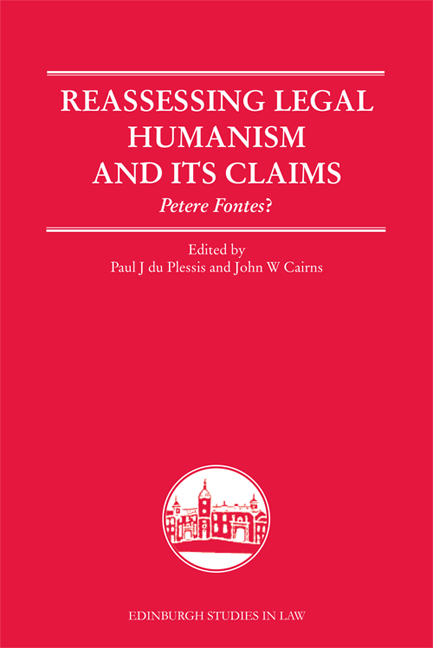Book contents
- Frontmatter
- Contents
- Preface
- A Note on Names and Book Titles
- List of Contributors
- List of Abbreviations
- Introduction
- Part I DEFINING LEGAL HUMANISM
- Part II A BREAK WITH THE PAST/CONTEMPORARY CRITIQUES
- Part III LEGAL HUMANISM: A PAN-EUROPEAN METHODOLOGY?
- 6 Elegant Scholastic Humanism? Arias Piñel's (1515–1563) Critical Revision of Laesio Enormis
- 7 The Working Methods of Hugo Grotius: Which Sources Did He Use and How Did He Use Them in His Early Writings on Natural Law Theory?
- 8 Joannes Leunclavius (1541–1594), Civilian and Byzantinist?
- 9 Brissonius in Context: De formulis et solennibus populi Romani verbis
- 10 A Lawyer and His Sources: Nicolas Bohier and Legal Practice in Sixteenth-Century France
- 11 Humanism and Law in Elizabethan England: The Annotations of Gabriel Harvey
- Part IV LEGAL HUMANISM AND THE BOOK TRADE
- Postscript
- Index
6 - Elegant Scholastic Humanism? Arias Piñel's (1515–1563) Critical Revision of Laesio Enormis
from Part III - LEGAL HUMANISM: A PAN-EUROPEAN METHODOLOGY?
Published online by Cambridge University Press: 05 September 2016
- Frontmatter
- Contents
- Preface
- A Note on Names and Book Titles
- List of Contributors
- List of Abbreviations
- Introduction
- Part I DEFINING LEGAL HUMANISM
- Part II A BREAK WITH THE PAST/CONTEMPORARY CRITIQUES
- Part III LEGAL HUMANISM: A PAN-EUROPEAN METHODOLOGY?
- 6 Elegant Scholastic Humanism? Arias Piñel's (1515–1563) Critical Revision of Laesio Enormis
- 7 The Working Methods of Hugo Grotius: Which Sources Did He Use and How Did He Use Them in His Early Writings on Natural Law Theory?
- 8 Joannes Leunclavius (1541–1594), Civilian and Byzantinist?
- 9 Brissonius in Context: De formulis et solennibus populi Romani verbis
- 10 A Lawyer and His Sources: Nicolas Bohier and Legal Practice in Sixteenth-Century France
- 11 Humanism and Law in Elizabethan England: The Annotations of Gabriel Harvey
- Part IV LEGAL HUMANISM AND THE BOOK TRADE
- Postscript
- Index
Summary
A. INTRODUCTION
B. THE CAREER AND CONVICTIONS OF A HUMANIST JURIST
(1)Combining erudition with practical engagement
(2)Praise of the individual against political absolutism
(3)The social nature of man and the do-no-harm principle
C. UNHOLY NEW IDEAS: PIÑEL's CRITICAL INTERPRETATION OF LAESIO ENORMIS
(1)The concept of laesio enormis is not part of classical Roman law
(2)The concept of dolus reipsa is a late medieval invention
(3)Imitating and emulating the French humanists
D. CONCLUDING REMARKS
INTRODUCTION
It is increasingly being recognised that broad tags such as “humanism” and “Scholasticism” fail to do justice to the “hybrid” nature of legal as well as theological sources of the early modern period, certainly in the Iberian world. A case in point are the Commentarii ad rubricam et legem 2, C. de rescindenda venditione by the Portuguese jurist Arias Piñel, a successful legal practitioner born in Sesimbra who combined his lawyering activities with a position at the University of Coimbra and later at Salamanca. By submitting C.4.44.2 to thorough philological and historical analysis, Piñel wanted to investigate the “true” meaning of laesio enormis. Against the gloss and the communis opinio doctorum, he claimed that the remedy by virtue of C.4.44.2 was unknown to the Roman jurists before the time of emperors Diocletian and Maximian. In Piñel's view, the irrelevance of lesion to pristine Roman law was obvious from a careful exegesis of various texts in the Digest. Although he expressed the fear that many scholars would bear the “new light of truth” on laesio enormis badly, Piñel went further in his critique of traditional legal scholarship by revealing the medieval origins of the allegedly Roman doctrine of objective deceit (dolus reipsa)– which was traditionally associated with the teachings on lesion. The mission of the jurist from Sesimbra was to combat anachronistic readings of the Roman sources. He believed that the French humanists did not go far enough in their exercise of contextualising the Roman legal tradition. Piñel wanted to highlight the fundamental difference between the pagan legal culture that had informed the classical Roman jurists, on the one hand, and the new mentality of the ius commune as it developed during the Christian Middle Ages, on the other.
- Type
- Chapter
- Information
- Reassessing Legal Humanism and its ClaimsPetere Fontes?, pp. 137 - 153Publisher: Edinburgh University PressPrint publication year: 2015



